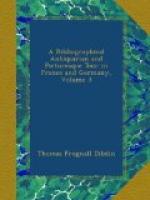In our way home, the discourse fell upon literature, and I was anxious to obtain from our venerable companion an account of his early studies, and partialities for the texts of such Greek authors as he had edited. He told me that he was first put upon collations of Greek MSS. by our Dr. Musgrave, for his edition of Euripides; and that he dated, from that circumstance, his first and early love of classical research. This attachment had increased upon him as he became older—had “grown with his growth, and strengthened with his strength”—and had induced him to grapple with the unsettled, and in parts difficult, texts of Appian, Epictetus, and Athenaeus. He spoke with a modest confidence of his Herodotus—just published: said that he was even then meditating a second Latin version of it: and observed that, for the more perfect execution of the one now before the public, he had prepared himself by a diligent perusal of the texts of the purer Latin historians. We had now entered the town, and it was with regret that I was compelled to break off such interesting conversation. In spite of the lateness of the hour (ten o’clock) and the darkness of the evening, the worthy old Grecian would not suffer me to accompany him home—although the route to his house was devious, and in part precipitously steep, and the Professor’s sight was not remarkably good. When we parted, it was agreed that I should breakfast with him on the morrow, at eight o’clock, as we intended to quit Baden at nine.




